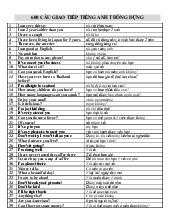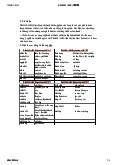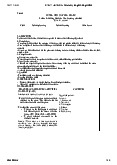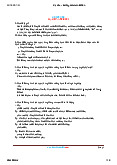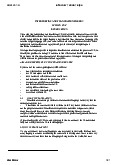






Preview text:
00:06 29/7/24
Week 4. Script - reading and writing SCRIPT TED TALK:
They told me that I’m a traitor to my own profession, that I should be fired, have my
medical license taken away, that I should go back to my own country.
I never thought that I would do something that would provoke this level of anger among
other doctors. Becoming a doctor was my dream. I grew up in China, and my earliest
memories are of being rushed to the hospital because I had such bad asthma that I was
there nearly every week. I had this one doctor, Dr. Sam, who always took care of me. She
was about the same age as my mother. She had this wild, curly hair, and she always wore
these bright yellow flowery dresses. She was one of those doctors whom, if you fell and
you broke your arm, she would ask you why you weren’t laughing because it’s your
humerus. Get it? See, you’d groan, but she’d always make you feel better after having
seen her. Well, we all have that childhood hero that we want to grow up to be just like,
right? Well, I wanted to be just like Dr. Sam. When I was eight, my parents and I moved
to the U.S., and ours became the typical immigrant narrative. My parents cleaned hotel
rooms and washed dishes and pumped gas so that I could pursue my dream. Well,
eventually I learned enough English, and my parents were so happy the day that I got into
medical school and took my oath of healing and service.
But then one day, everything changed. My mother called me to tell me that she wasn’t
feeling well, she had this cough that wouldn’t go away, that she was short of breath and
tired. Well, I knew that my mother was someone who never complained about anything.
For her to tell me that something was the matter, I knew something had to be really
wrong. And it was: We found out that she had stage IV breast cancer, cancer that by then
had spread to her lungs, her bones, and her brain. My mother was brave, though, and she
had hope. She went through surgery and radiation, and was on her third round of
chemotherapy when she lost her address book. She tried to look up her oncologist’s
phone number on the Internet and she found it, but she found something else too. On
several websites, he was listed as a highly paid speaker to a drug company, and in fact about:blank 1/7 00:06 29/7/24
Week 4. Script - reading and writing
often spoke on behalf of the same chemo regimen that he had prescribed her. She called
me in a panic, and I didn’t know what to believe. Maybe this was the right chemo
regimen for her, but maybe it wasn’t. It made her scared and it made her doubt. When it
comes to medicine, having that trust is a must, and when that trust is gone, then all that’s left is fear.
But it’s not just patients who are scared; doctors are scared too. We’re scared of patients
finding out who we are and what medicine is all about. And so what do we do? We put
on our white coats and we hide behind them. Of course, the more we hide, the more
people want to know what it is that we’re hiding. The more fear then spirals into mistrust
and poor medical care. We don’t just have a fear of sickness, we have a sickness of fear.
Can we bridge this disconnect between what patients need and what doctors do? Can we
overcome the sickness of fear? Or let me ask you differently: If hiding isn’t the answer,
what if we did the opposite? What if doctors were to become totally transparent with their patients?
Last fall, I conducted a research study to find out what it is that people want to know
about their healthcare. I didn’t just want to study patients in a hospital, but everyday
people. So my two medical students, Suhavi Tucker and Laura Johns, literally took their
research to the streets. They went to banks, coffee shops, senior centers, Chinese
restaurants, and train stations. What did they find? Well, when we asked people, “What
do you want to know about your healthcare?” people responded with what they want to
know about their doctors, because people understand health care to be the individual
interaction between them and their doctors. When we asked people, “What do you want
to know about your doctors?” people gave three different answers. Some want to know
that their doctor is competent and certified to practice medicine. Some want to be sure that their doctor
is unbiased and is making decisions based on evidence
and science, not on who pays them. Surprisingly to us, many people want to know about:blank 2/7 00:06 29/7/24
Week 4. Script - reading and writing
something else about their doctors. One after another, our respondents told us that that
doctor-patient relationship is a deeply intimate one—that to show their doctors their
bodies and tell them their deepest secrets, they want to first understand their doctor’s
values. Just because doctors have to see every patient doesn’t mean that patients have to
see every doctor. People want to know about their doctors first so that they can make an informed choice.
As a result of this, I formed a campaign, Who’s My Doctor? that calls for total
transparency in medicine. Participating doctors voluntarily disclose on a public website
not just information about where we went to medical school and what specialty we’re in,
but also our conflicts of interest. We go beyond the government Sunshine Act about drug
company affiliations, and we talk about how we’re paid. Incentives matter. If you go to
your doctor because of back pain, you might want to know that he’s getting paid 5,000
dollars to perform spine surgery versus 25 dollars to refer you to see a physical therapist,
or if he’s getting paid the same thing no matter what he recommends.
Well, I thought some doctors would sign on and others wouldn’t, but I had no idea of the
huge backlash that would ensue.
From an orthopedic surgeon in Charlotte: “I find it an invasion of my privacy to disclose
where my income comes from. My patients don’t disclose their incomes to me.” But your
patients’ sources of income don’t affect your health.
Within a month, my employers were getting calls asking for me to be fired. I received
mail at my undisclosed home address with threats to contact the medical board to
sanction me. My friends and family urged me to quit this campaign. But then I heard
from patients. Over social media, a TweetChat, which I’d learned what that was by then,
generated 4.3 million impressions, and thousands of people wrote to encourage me to
continue. They wrote with things like, “If doctors are doing something they’re that
ashamed of, they shouldn’t be doing it.” “Elected officials have to disclose campaign about:blank 3/7 00:06 29/7/24
Week 4. Script - reading and writing
contributions. Lawyers have to disclose conflicts of interests. Why shouldn’t doctors?”
And finally, many people wrote and said, “Let us patients decide what’s important when we’re choosing a doctor.”
Research has shown us that openness also helps doctors, that having open medical
records, being willing to talk about medical errors, will increase patient trust, improve
health outcomes, and reduce malpractice.
Here’s what other transparent doctors have said.
Brandon Combs, an internist in Denver: “This has brought me closer to my patients. The
type of relationship I’ve developed—that’s why I entered medicine.”
May Nguyen, a family physician in Houston: “My colleagues are astounded by what I’m
doing. They ask me how I could be so brave. I said, I’m not being brave, it’s my job.”
I leave you today with a final thought. Being totally transparent is scary. You feel naked,
exposed and vulnerable, but that vulnerability, that humility, it can be an extraordinary
benefit to the practice of medicine. When doctors are willing to step off our pedestals,
take off our white coats, and show our patients who we are and what medicine is all
about, that’s when we begin to overcome the sickness of fear. That’s when we establish
trust. That’s when we change the paradigm of medicine from one of secrecy and hiding to
one that is fully open and engaged for our patients. Thank you. about:blank 4/7 00:06 29/7/24
Week 4. Script - reading and writing SCRIPT EXTRA TASK
Today, I would like to share something with you about time. Particularly, I'll be looking
at the way we think about time, and how these perspectives of time structure our life.
Social psychologists have pointed out that there are six ways of thinking about time,
which they regard as personal time zones.
The first two types of time zones are based in the past. Past positive thinkers usually
spend a major part of their time looking back to the past, which means they are in a state
of nostalgia, where they fancy remembering moments of happiness such as birthdays,
marriages and important success time in their lives.
They are those who have the habit of keeping family records, books and photo albums.
The kinds of people living in a past negative time zone are also absorbed by earlier times,
but they concentrate on all the negative sides of a life picture such as regrets, failures or
poor decisions. They spend plenty of time imagining what life could have been.
Then, it is those who live in the present. Present hedonists live their life in pleasure and
immediate sensation. Their life motto should be having a good time and avoiding painful experiences.
Present fatalists live in the present as well; however, they think this moment is the
product of circumstances entirely beyond their control, but it is more a fate. Whether it's
poverty, religion or society itself, something prohibits fatalists from thinking that they do
perform a role in changing their life outcomes. Life is simply what it is.
How about the future time zone? People who are sorted into future active group are those
who do plans and go for their plans. They don't play but work, and resist temptation.
They make decisions in terms of potential consequences, rather than experience itself.
The other type of future-oriented perspective is future fatalistic. This group of people
holds a belief that there will be a certainty of life after death and certain kind of
judgement day when they will be assessed on how virtuously they have had a life and
what achievements they have had in their lives. about:blank 5/7 00:06 29/7/24
Week 4. Script - reading and writing
Okay, so much for all the types. You now may ask ‘in what ways are our lives influenced
by these time zones?' Well, let's start at the beginning. When we were born, no
exceptions, everyone was a present hedonist. All the initial needs and demands like being
warm, secure, fed and watered were all from that time.
But formal education will change the way we think. Each one of us is taught to prevent
focusing only on the moment and start to make estimates about the future. But you might
be surprised, every nine seconds a child drops out of school in the US. More
interestingly, there're much more boys dropping out than girls doing so.
We may easily draw a conclusion: 'boys aren't as intelligent as girls.' But the evidence
doesn't support this. A recent survey indicates that when American boys reach the age of
21, they have spent roughly 10,000 hours on video games and also suggests that they'll
never fit in the traditional classroom, because there is a stronger need for those boys to
have a certain circumstance in which they are capable of managing their own learning environment.
Now, let's move on to how we do prevention education. All kinds of prevention education
are usually targeted at the future time zone. We say 'don't smoke or you'll get cancer', 'get
good grades or you won't get a good job.' But as for present-oriented kids, it doesn't make sense.
Though they do know the potentially detrimental consequences of their actions, they
insist on how they behave because they're not living for the future. They are in the
present right now. Logics won't be helping and it's no use reminding them of potential
fallout from their decisions or previous judgement errors.
We have to get in their minds just as they're about to make a choice. How we value and
use our time is greatly influenced by the time perspectives we have. When Americans
come across a question about how busy they are, most of the interviewees usually report being busier than ever before.
They admit to sacrificing their relationships, personal time and good sleep during nights
for their careers. But 20 years ago, 60% of Americans had sit-down dinners with their
families, yet now the number dropped to 20%. about:blank 6/7 00:06 29/7/24
Week 4. Script - reading and writing
However, when they're asked what if there are 8 days in a week, they say 'Oh, that'll be
fabulous'. They would spend that time working to achieve more. They're persistently
trying to get to the future point of happiness.
So, it's of vital importance that we know how other people think about time. We tend to
think: 'Oh, that person is really irresponsible,' or 'That guy is power hungry,' but often
what we care about is not the fundamental personality differences, but only various
approaches of thinking about time.
Rather than distinctions of characteristics, seeing these conflicts as differences in time
perspectives can promote more effective cooperation between people and get the most
out of each person's individual strengths. about:blank 7/7
